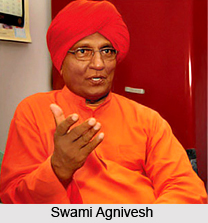 Swami Agnivesh was born on September 21, 1939 in Chattisgarh. He is known for his work against bonded labour through the. He is the founder of Bonded Labour Liberation Front which he founded in 1981. He is also the founder of Arya Samaj and became president of the World Council which he describes as an associate of the original Arya Samaj. He also served as the chairperson of the United Nations Voluntary Trust Fund on Contemporary Forms of Slavery from 2001 to 2004.
Swami Agnivesh was born on September 21, 1939 in Chattisgarh. He is known for his work against bonded labour through the. He is the founder of Bonded Labour Liberation Front which he founded in 1981. He is also the founder of Arya Samaj and became president of the World Council which he describes as an associate of the original Arya Samaj. He also served as the chairperson of the United Nations Voluntary Trust Fund on Contemporary Forms of Slavery from 2001 to 2004.
Early life and Education of Swami Agnivesh
He was initially known as Shyam Vepa Rao. He received his degrees in Law and Economics in Kolkata. He worked as a lecturer of Business Management at St. Xavier`s College, Calcutta for few years.
Swami Agnivesh`s entry into Politics
In 1970 he founded Arya Sabha, a political party based on Arya Samaj principles. He also became a member of the Legislative Assembly of Haryana in 1977, and served as a State Minister for Education from 1979 to 1982. In 1981he founded the Bonded Labour Liberation Front, which continues to raise issues bonded labour in India.
He also took part in the anti-corruption protests in India in August 2011.
Social activism of Swami Agnivesh
He testified before the Working Group on Contemporary Forms of Slavery at the United Nations Human Rights Commission in Geneva. He also created a new task for emancipation of womanhood.
Agnivesh was part of a two week campaign against female foeticide in 2005. In 1968, Agnivesh he joined the Arya Samaj and on March 25, 1970, Agnivesh took the sanyas tradition. He was expelled from the organization in August 2008.
Awards received by Swami Agnivesh
Rajiv Gandhi National Sadbhavana Award (Religious & Communal
Harmony Award 2004)
Right Livelihood Award 2004 - Sweden
M.A.Thomas National Rights Award 2006, Bangalore
Works of Swami Agnivesh
* Vaidik Saamajvad - Vedic Socialism 1974.
* Religion Revolution and Marxism
* Harvest of Hate: Gujarat under Siege with Valson Thampu.
* Religion, Spirituality and Social Action New Agenda for Humanity: New Agenda for Humanity
* Hinduism in the New Age.
He has also served as the chief Editor of Rajdharma and Kranti Dharmi magazines









